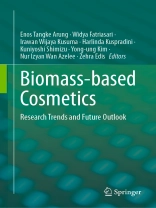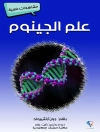This book highlights the potential of biomass for cosmetics applications. It covers the discussion on biomass as a source for cosmetics from savanna, marine and tropical forest, trend and market outlook of biobased cosmetics, active substances from biomass for cosmetics, extractives from biomass for cosmetics, other non-wood forest products such as essential oil, tengkawang, and bee pollen. Besides that, the potency of biopolymers such as lignin, and polysaccharides are presented. The book also discusses activated carbon as a cosmetic source. To present more comprehensive information, it covers biomass as anti-aging, anti-acne, sunscreen, anti-melanin, and antimicrobial. Regarding the close contact system with the human in daily life, cosmetic needs to comply with the human system. Therefore, one special chapter is dedicated to presenting the compatibility view of biobased cosmetics in the human body system. Nanomaterials in cosmetics have started to be used by many beauty companies asindicated by nano-related patents. The nanotechnology applications in cosmetics also provide future trends in bio-based cosmetics. Some forms of nanomaterials that have been reported include liposomes, nanoemulsion, nanocapsules, solid lipid nanoparticles, nanocrystals, nano-silver, nano-gold, hydrogel, etc. Iodinated Aloe Vera formulations within polymeric complexes present examples of bio-antimicrobials and such compounds are at the crossroads between pharmaceutics and cosmetics. Finally, the environmental and safety impacts of biobased cosmetic development are discussed as the closure in the last chapter.
This book is expected to provide insightful information for those dealing with biomass or doing research on biomass for sustainable living. Moreover, it is also suitable for policymakers to get the new and latest information on valorizing local biomass while expanding its usage for cosmeceutical purposes. Due to the current environmental problems occurring in our surroundings, this book is seen to be an important tool to spread awareness of the smart way of utilizing our precious biomass and transforming it into valuable products.
表中的内容
Chapter 1. Introduction: Potency tropical biomass for the bioactive ingredients in cosmetic.- Chapter 2. Trend or market outlook of biobased cosmetic ingredients.- Chapter 3. The activity of tropical biomass for bioactive ingredient in cosmetics.- Chapter 4. Algae for cosmetic application.- Chapter 5. Other marine biomass for cosmetics.- Chapter 6. Savanna biomass for cosmetics sources.- Chapter 7. Fungi for cosmetics sources.- Chapter 8. Silkworm for cosmetic application.- Chapter 9. Lignin for a cosmetic application.- Chapter 10. Essential oils for a cosmetics application.- Chapter 11. Tengkawang for a cosmetics application.- Chapter 12. Bee pollen as a cosmeceutical application.- Chapter 13. Iodinated Aloe Vera formulations for antimicrobial and cosmeceutical applications.- Chapter 14. Activated carbon for a cosmetic application.- Chapter 15. Collagen for cosmetics ingredient.- Chapter 16. Polysaccharide extracted biomass for cosmeceutical application.- Chapter 18. Cellulose and Nanocellulose for cosmetic.- Chapter 19. Tropical biomass for an antiacne agent.- Chapter 20. Tropical biomass for an anti-aging agent.- Chapter 21. Tropical biomass for an anti-whitening agent.- Chapter 22. Tropical biomass for sunscreen agent.- Chapter 23. Compatibility biomass-based cosmetic for human.- Chapter 24. Nanotechnology roles in cosmetics.- Chapter 25. Biomass for active packaging in cosmetics.- Chapter 26. Environmental and safety impacts of biobased cosmetic development.
关于作者
Prof. Dr. Enos Tangke Arung (Professor, University of Mulawarman)
He is a scientist in the Forestry Faculty, University Mulawarman, Indonesia. The focus of the research is natural resources from tropical rain forests for medicine and cosmetics, isolating active compounds, non-wood forest products, and Stingless bee products for utilization in cosmetics and medicines. Publish more than 55 scientific papers, 5 granted patents, and 3 books. He has been granted some awards as an academic leader and researcher in green cosmetics in Indonesia. In addition, He is a reviewer in some reputable scientific journals.
Prof. Dr. Widya Fatriasari (Research Professor, National Research and Innovation Agency)
She is a senior researcher at the Research Center for Biomass and Bioproducts, National Research and Innovation Agency (BRIN), Indonesia. The primary research areas are biomass conversion, bioenergy, biorefinery, lignin valorization for bioproducts, cellulose-based bioproducts, and biomass chemistry. She has been involved in various research projects, such as lignin for biosurfactants, fire retardants, seed coating, biocomposite, marine biomaterials, cosmetics from biomass, biomedical pulp, and pulp and paper.
Prof. Dr. Irawan Wijaya Kusuma (Professor, University of Mulawarman)He is a Professor at the Faculty of Forestry, Mulawarman University, Indonesia. His research interests are forest product chemistry and non-timber forest products. His works are related to the exploration of tropical plants having biological activities and the discovery of antimicrobial, antioxidant, and enzyme-inhibitory compounds from plant resources. He has published more than 61 scientific articles in peer-reviewed international journals, 4 granted patents, and 3 books (one of them published by the ACS publication). He is an editor and reviewer for several reputable peer-reviewed international journals.
Prof. Dr. Harlinda Kuspradini (Professor, University of Mulawarman)He is a researcher and lecturer at the Faculty of Forestry, Mulawarman University, Indonesia. Her research interest is non-timber forest products, especially medicinal and aromatic plants. She led the ‘A Tropical Rainforest Essential Oil’ group research, which discovered new types of essential oil and developed the products. She has been involved in various research projects with national and international funding. She has authored 5 books and possesses many publications, 4 granted patents, and 3 national copyrights. She has multiple duties as a reviewer and editor in many journals. She has been bestowed with the prestigious ‘L’Oreal-UNESCO’ Award in 2010 for her contribution to the field of Life Science.
Prof. Kuniyoshi Shimizu (Professor, Kyushu University)He received a Ph. D in natural product chemistry, graduated from Faculty of Agriculture, Kyushu University in 2000. Then, he worked in Venture Business Laboratory, Kyushu University as a postdoctoral fellow (2000-2002). In 2002, he returned to the Faculty of Agriculture, Kyushu University as an assistant professor. Then, in 2014, he was promoted to an associate professor. His research group has
been focusing on how to utilize natural products based on the LOHAS (Lifestyles of Health and Sustainability) concept with relevant scientific evidence. He received The Japan Wood Research Society Progress Award in 2006 and The Japan Wood Research Society Award in 2014.
Prof. Yong-ung Kim (Professor, Daegu Haany University)He is an associate professor of the Department of Pharmaceutical Engineering, College of Cosmetics and Pharmaceuticals, Daegu Haany University, South Korea. He is a pharmacist and oriental medicine dispenser in South Korea. He received his BS in pharmacy in 1990 and MS and Ph D in pharmacy (biological chemistry) in 1992 and 2000, respectively, at Seoul National University, South Korea. He was a postdoctoral fellow from 2000-05at the College of Pharmacy, Seoul National University, South Korea, and in 2005-07 of Japan Society for the Promotion of Science (JSPS) Postdoctoral Fellowship for Foreign Researchers at the Faculty of Agriculture, Kyushu University, Japan. He is a member of the Pharmaceutical Society of Korea and the Korean Society for Applied Biological Chemistry. His achievements include papers and patents for 5α-reductase inhibitors from natural products for curing benign prostatic hypertrophy
Dr. Nur Izyan Wan Azelee (Associate Research Fellow, Institute of Bioproduct Development, Universiti Teknologi Malaysia)
She is a senior lecturer at Universiti Teknologi Malaysia (UTM) and is currently an associate research fellow at the Institute of Bioproduct Development (IBD). She has obtained her bachelor’s degree as well as completed her Ph.D. in Bioprocess Engineering from UTM. Her research expertise is in enzyme technology, enzyme immobilization, carbohydrate analysis, biomass pretreatment, biomass conversion, process optimization, and enzyme kinetics. Currently, she is working on the pretreatment of biomass for efficient delignification, enzymatic hydrolysis and optimization for high sugar production, enzyme immobilization for transesterification for biodiesel production, and bioconversion of biomass into valuable ingredients for cosmetic products. She is an expert in operating HPLC using an RI detector for carbohydrate analysis and Response Surface Methodology (RSM) software for process screening and optimization.
Dr. Zehra Edis (Associate Professor, Ajman University)She received a Ph D from the University of Cologne Germany and received her Ph D. with honors in 1999. She worked as a scientific employee at the University of Cologne and Akzo Nobel Chemicals, as well as a research Intern at Bayer AG, Leverkusen, Germany on the properties of conducting polymers. After that, she joined Ajman University and Sharjah University, UAE as a Part-time lecturer (2000-2013). Since February 2014 she has been a faculty member and was promoted to Associate Professor in 2021 at Ajman University. She has published more than 50 papers and received 8 Internal Research Grants (IRG-Deanship of Graduate Studies and Research) from Ajman University. Since 2021 she has also associated with the Center of Medical and Bio-allied Health Sciences Research, at Ajman University.












